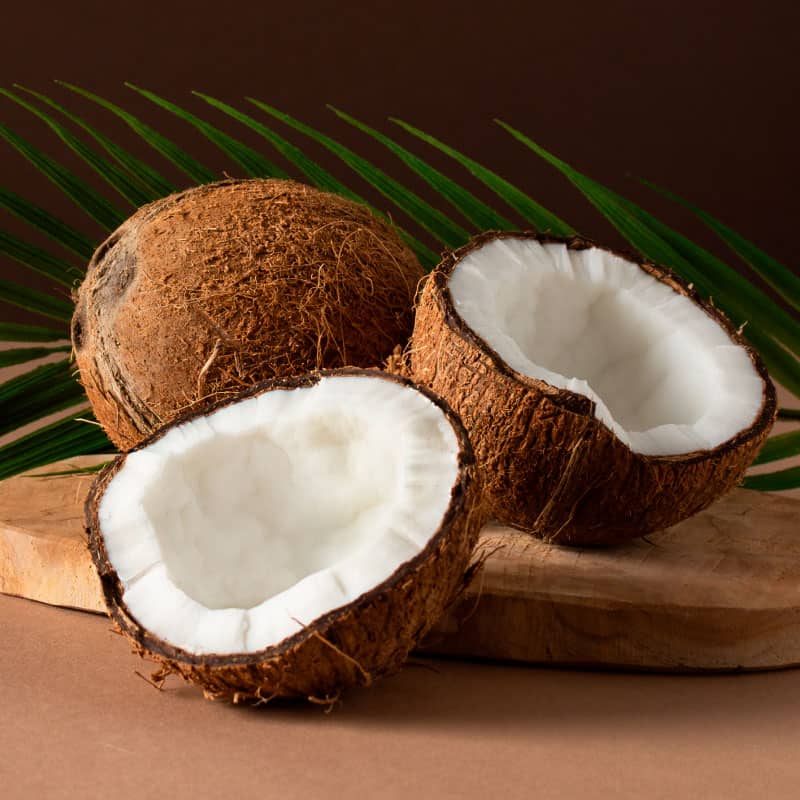Is coconut milk keto? Yes! It can be a delicious addition to a Keto diet—but be careful not to choose the wrong kind.
What is the Keto Diet?

The ketogenic (keto) diet is a nutritional approach focused on high-fat, low-carbohydrate intake, designed to stabilize insulin and blood sugar levels. By prioritizing fats over carbs, this diet supports overall wellness and can aid in sustainable weight management.
To achieve ketosis—a metabolic state where the body burns fat for energy—daily carbohydrate intake must remain below 50 grams. Exceeding this threshold can disrupt ketosis, halting its benefits. For success, emphasize foods naturally low in carbs and rich in healthy fats.
What is Coconut Milk?

Coconut milk is a creamy, nutrient-dense liquid derived from the grated meat of mature coconuts. To produce it, the coconut flesh is soaked in hot water, blended, strained, and pressed to extract its rich, milky liquid.
Unlike coconut water (the clear, mildly sweet liquid inside young coconuts), coconut milk contains fewer carbs. While coconut water has a higher carb content, small portions can still fit into a keto lifestyle without spiking blood sugar.
A staple in Southeast Asian cuisines, coconut milk adds depth to curries, soups, and sauces. It also serves as a versatile, lactose-free substitute for dairy in coffee, smoothies, baked goods, and savory dishes. Its adaptability makes it a cornerstone ingredient for crafting flavorful, keto-friendly meals.
Why It’s Keto-Friendly:

With its low carb count and high healthy fat content, coconut milk aligns seamlessly with keto principles, offering a creamy base for countless recipes while keeping you in ketosis.
Types of Coconut Milk

Coconut milk is available in various forms—canned, carton, and bottled—each with distinct textures, flavors, and nutritional profiles. Here’s a breakdown of the most common varieties and their keto compatibility:
1. Canned Unsweetened Coconut Milk
Best for Keto:
- Rich & Creamy: Contains minimal added water, resulting in a thick, concentrated texture and higher fat content—ideal for curries, soups, and keto desserts.
- Nutritional Powerhouse: High in healthy fats and low in carbs, making it a staple for maintaining ketosis.
- Versatile: Perfect for cooking, baking, or adding richness to savory and sweet dishes.
2. Carton Coconut Milk (Refrigerated
Use with Caution:
- Thinner Consistency: Diluted with water to mimic low-fat dairy milk, making it less creamy than canned versions.
- Common Uses: Smoothies, coffee creamer, or cereal.
- Watch for Additives: Some brands include sugars, thickeners (like carrageenan), or preservatives—always opt for unsweetened, unflavored varieties.
3. Coconut Milk Beverages (Bottled/Pre-Made Drinks)
Often Not Keto-Friendly:
- Watered Down: Typically contains added water, sweeteners (cane sugar, agave), and artificial flavors.
4. Canned Light Coconut Milk
Keto-Safe but Less Ideal:
- Lower Fat Content: Creamy fat layers are removed, leaving a thinner, watery liquid.
- Mild Flavor: Suitable for light sauces or soups, but lacks the richness of full-fat versions.
- Still Low-Carb: While less nutritious, it remains keto-friendly if unsweetened.
Key Takeaway: For keto, prioritize canned unsweetened coconut milk for its high fat, low carb profile. Avoid sweetened or flavored carton/bottled options, and always verify labels to dodge hidden sugars or additives.
How Many Carbs Are in Coconut Milk?

Unsweetened coconut milk is low in carbohydrates and high in fat, making it an excellent choice for a ketogenic diet. However, it’s important to avoid varieties with added sugar, as they can quickly exceed your daily carb limit.
Different types of coconut milk, canned, light, and carton, have unique nutritional profiles. Here’s a breakdown:
Coconut Milk Nutrition Facts
Canned Coconut Milk (1 cup):
- Fat: 58 grams
- Net Carbs: 8 grams
- Potassium: 631 milligrams
Light Coconut Milk (1 cup):
- Fat: 15 grams
- Net Carbs: 6 grams
- Potassium: 40 milligrams
Carton Coconut Milk (1 cup):
- Fat: 4 grams
- Net Carbs: 1 gram
- Potassium: 310 milligrams
Coconut Milk Benefits on a Keto Diet

Adding coconut milk into a ketogenic diet offers several advantages. Here are five compelling reasons to include it in your weekly meal planning:
- Naturally Low-Carb and High-Fat
Coconut milk is inherently high in fat and low in carbohydrates, making it suitable for keto-friendly recipes without disrupting ketosis. - Rich in MCTs (Medium-Chain Triglycerides)
Coconut milk contains lauric acid, a type of MCT that is quickly absorbed and converted into ketones, providing a rapid energy source and promoting satiety between meals. - High in Electrolytes
A single cup of canned coconut milk provides approximately 631 mg of potassium, along with magnesium, calcium, and phosphorus, supporting hydration and muscle function. - Contains Anti-Inflammatory and Antimicrobial Compounds
The fatty acids in coconut milk can increase levels of monolaurin in the body, a compound known for its anti-inflammatory, antibacterial, and antifungal properties. - Lactose-Free Alternative
Coconut milk is free from lactose, making it an excellent dairy substitute for individuals with lactose intolerance or dairy sensitivities.
Wrapping Up
Unsweetened, full-fat coconut milk is naturally low in carbohydrates and rich in healthy fats, making it an excellent addition to a ketogenic meal plan. However, it’s important to avoid varieties with added sugars, as they can quickly exceed your daily carb limit.
While low-fat coconut milk options are keto-friendly, they lack the beneficial fats that support ketosis. For the best health benefits and a rich, creamy flavor, full-fat coconut milk is the preferred choice.















Leave a comment